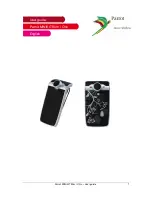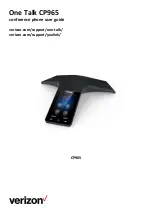
Index
:: 151
FCC RF Safety Statement
In order to comply with FCC RF
exposure safety guidelines, users MUST use one of the following
types of body-worn accessories.
1. A Handspring brand body-worn accessory that has been tested
for SAR compliance and is intended for use with this product.
2. An accessory that contains NO metal (snaps, clips, etc) and provides
AT LEAST 1 cm of separation between the users body and the unit.
Do NOT use the device in a manner such that it is in direct contact
with the body (i.e. on the lap or in a breast pocket). Such use will likely
exceed FCC RF safety exposure limits See www.fcc.gov/oet/rfsafety/
for more information on RF exposure safety.
Responsible party
(North America)
(Europe)
Handspring, Inc.
John Hartnett
189 Bernardo Avenue
VP Worldwide Operations
Mountain View, CA 94043
Handspring
United States of America
89 rue de Lyon
www.handspring.com
1203 Geneva, Switzerland
Antenna Care/Unauthorized Modifications
Use only the supplied
integral antenna. Unauthorized antenna modifications or attachments
could damage the unit and may violate FCC regulations. Any changes
or modifications not expressly approved by the party responsible for
compliance could void the user’s authority to operate the equipment.
Declaration of Conformity
Treo Model 600
Handspring declares that the above models of Treo
communicators are compliant with the regulations below. The declaration
applies to the communicators and their associated accessories (power
supply, headset, USB and serial cable) where applicable.
Maximum Measured SAR Values (W/kg)
Band:
850 MHz
900 MHz
1800 MHz
1900 MHz
Head SAR:
1.49
1.07
1.53
1.05
Body SAR:
.646
.703
.402
.336
EMC: EN 301 489
GSM: EN 301 419-1(Apr 2000)
EN 310 420 (Dec 1999)
SAR: ANSI/IEEE C95.1 1992
EN 50360 (July 2001)
EN 50361 (July 2001)
FCC OET Bulletin 65 Supplement C
Safety: EN 60950: 2000 (Jan-2000)
Radiated Emissions: EN 55022
Immunity: EN 55024
FCC Statement
This device complies with part 15 of the FCC
rules. Operation is subject to the following two conditions: (1) This
device may not cause harmful interference, and (2) this device must
accept any interference received, including interference that may
cause undesired operation.
This device has been tested and found to comply with the limits
for a Class B digital device, pursuant to part 15 of the FCC Rules.
These limits are designed to provide reasonable protection against
harmful interference in a residential installation. This equipment
generates, uses, and can radiate radio frequency energy and, if not
installed and used in accordance with the instructions, may cause
harmful interference to radio communications. However, there is no
guarantee that interference will not occur in a particular installation.
If this equipment does cause harmful interference to radio or
television reception, which can be determined by turning the
equipment off and on, the user is encouraged to try to correct the
interference by one or more of the following measures:
• Reorient or relocate the receiving antenna
• Increase the separation between the equipment and receiver
• Connect the equipment into an outlet or circuit different from that
to which the receiver is connected
Consult the dealer or an experienced radio/TV technician for help
and for additional suggestions.
RF Safety Exposure To Radio Frequency Energy (SAR)
Radio
transmitting devices radiate Radio Frequency (RF) energy during its
operation. RF energy can be absorbed into the human body and
potentially can cause adverse health effects if excessive levels are
absorbed. The unit of measurement for human exposure to RF
energy is “Specific Absorption Rate” (SAR).
The Federal Communications Commission (FCC), Industrie
Canada (IC), and other agencies around the world have established
limits that incorporate a substantial safety margin designed to
assure the safety of all persons using this equipment.
In order to certify this unit for sale in the US, Canada and Europe
this unit has been tested for RF exposure compliance at a qualified
test laboratory and found to comply with the regulations regarding
exposure to RF Energy.
SAR was measured with the unit transmitting at its maximum
certified RF power. Often, however, during normal operation the unit
will transmit much less than maximum power. Transmit power is
controlled automatically and, in general is reduced as you get closer
to a cellular base station. This reduction in transmit power will result
in a lower RF energy exposure and resulting SAR value.
150 ::
FCC
index
5-way navigation control 10, 15,
18–21, 26, 36–40, 42–44,
47–48, 50–51, 82, 95, 121,
128, 129, 145
5-way calling. See Conference calls
A
AC charger 9, 12, 28
Accented characters 23–24
Active call 41, 42–44, 52, 121, 134
Add-on applications. See Third-
party applications
Address Book. See Contacts
Adjusting volume 110–111, 113
Alarms and alerts
Answer Phone 35, 41
Photo Messaging 70, 72
preset 83
setting 83
sound 110–111, 120
Text Messaging 65
vibrating 113
voicemail 35, 41
Anniversaries. See Repeating
events
Answer Phone 40–41, 51
Answering calls 39, 44, 46, 52, 134
Antenna 9, 150
Applications
beaming 98, 148
Blazer 26, 53–59, 100, 140,
143, 147
buttons 10, 25–26, 49, 51, 73,
80, 117, 129
Calculator 23, 26, 93–94
Calendar 10, 25, 26, 42,
82–86, 87, 110–111, 113,
119, 120, 128, 139
categories 26, 106, 116
CityTime 91–92
Desktop software 27, 29, 30,
47, 63, 82, 101–102, 103,
126, 128, 130, 132,
137–139, 148
E-Mail 26, 73–80, 110–111,
140–142, 147
font style 115
Info 104, 107, 117
installing 27, 29, 77, 100–102,
128, 130, 131, 132, 139,
145, 147, 148
Launcher 22, 26, 98, 100–104,
106–107, 116, 129, 148
Memo Pad 90
opening 25–26, 49, 51, 65, 106
Phone 10, 15, 16, 25, 26,
34–51, 95, 97, 110–112,
121–123, 149
Photo Messaging 5, 13, 69–72,
110–111, 147, 149
Preferences 36, 45–46, 54, 57,
58–59, 62, 67–68, 72, 76,
79–80, 84–86, 89,
110–126, 129, 141
removing 103, 145
security 53, 76, 121–126,
130, 141
Text Messaging 38, 49,
64–68, 111, 120, 149
third-party 18, 73, 77, 96,
100–103, 126, 128, 129,
130, 131, 132, 138, 139,
140, 141, 145, 146, 147, 149
To Do List 86–89, 120
Appointments. See Calendar
Archive files
for deleted applications 103
saving completed To Do items 87
Auto-off setting 31, 120, 123, 140
B
Backlight, keyboard 12, 14, 22,
31, 114, 129
Backup. See HotSync
Battery
charging 12, 15, 31
conserving power 12, 14, 31, 120
gauge 12, 35
low 31, 131
type 148
usage 35
Beaming
applications 98, 120, 148
business card 48, 97
information 97–98, 120, 148
location of IR port 9, 97
problems with 120
See also Infrared
Beep tone 14, 15, 106, 110–111,
113, 120
Birthdays. See Repeating events
Blazer
bookmarks 54–56
opening 26, 53
overview 53
installing applications from 100
Preferences 58–59
problems with 143, 147
viewing web pages 53–54,
57–58
Boilerplates. See Templates
Bold font for text 115
Bookmarks 54–56
Brightness Control 31, 114, 133
Business card for beaming 48, 97
Buttons
5-way navigation 10, 15,
18–21, 26, 36–40, 42–44,
47–48, 50–51, 82, 95, 121,
128, 129, 145
application 10, 25–26, 49, 51,
73, 80, 117, 129
Calendar 10, 25–26, 82–86,
117, 128
HotSync 28, 30, 117
Messaging 10, 25–26, 64–68,
73, 117
Phone 10, 15, 16, 25–26, 34–51,
60, 95, 112, 122, 128, 146
preferences 117
ringer switch 9, 39, 97, 113, 120
Screen 10, 14, 25–26, 121, 129
volume 10, 16, 39, 110, 111, 113
Wireless Mode 9, 14, 15, 122,
132, 135
C
Cable
charger 12
connecting to computer 28
HotSync 9, 27–28, 30, 117,
137, 138
Calculator 23, 26, 93–94
Calendar
adding events 82–84
alarm 83, 110–111, 113, 120
button 10, 25–26, 82–86,
117, 128
changing events 83
conflicting events 85
deleting events 83
display format 82, 84–86
floating events 85
fonts 115
opening 25–26, 128
Preferences 84–86
repeating events 84
scheduling events 82–84
selecting date 82
start of week 119
switching views 82
synchronizing 82, 139
To Do List items 86
untimed events 82, 83
using during call 42
Calibration 15, 115, 133
Call
5-way conference 44
5-way navigation 42, 121
active 42–44, 121
Answer Phone 41
answering 39, 44, 52
barring 46
conference 44
data 35, 136
dialing 15, 23, 36–38, 71
emergency 121
ending 15, 42, 52
forwarding 31, 35, 45–46
hanging up 15, 42, 52
history log 38
ignoring 39, 44
incoming 14, 39, 44, 120, 135
missed 35, 41
muting 42
outgoing 14, 15, 36–38, 71
placing a second 42, 43
placing on hold 42
Preferences 45–46, 110
preventing 39, 46, 121, 134
receiving 14, 39, 44, 120, 135





































